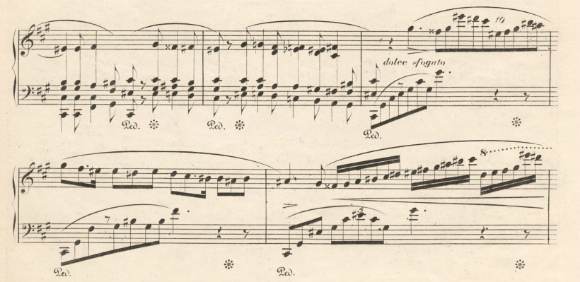The story told by Robert Levin involved snickering Italian waiters. Bob asked quite a few Italian speakers, “What does sfogato mean?” (An Italian-English dictionary will say something like “letting loose.”) The motivation for Levin’s particular curiosity was the use of the term in the score of Chopin’s Barcarolle (m. 78). It’s a word that doesn’t appear in (earlier) piano music.
Frédéric Chopin: Barcarolle
In this written music, “sfogato” — “dolce sfogato” — invokes, refers to, or is contextualized by some of the most beloved female singers in 19th-century Paris. In the opera house of the 1830s, voice range-types were differently understood than they were later. Many of Chopin’s favorite sopranos were contraltos!
 “Soprano sfogato” (sometimes “soprano assoluta” or “soprano sfogato assoluta”) described Giuditta Pasta, Maria Malibran, Chopin’s colleague Pauline Viardot, and later Adelina Patti. They could sing notes in low contralto range, but they were “unlimited,” singing frequently in high soprano. This was a time of transition. In place of castratos, women like these connected high-range-down-through-low (and up again) as the Barcarolle’s “sfogato” passage signifies.
“Soprano sfogato” (sometimes “soprano assoluta” or “soprano sfogato assoluta”) described Giuditta Pasta, Maria Malibran, Chopin’s colleague Pauline Viardot, and later Adelina Patti. They could sing notes in low contralto range, but they were “unlimited,” singing frequently in high soprano. This was a time of transition. In place of castratos, women like these connected high-range-down-through-low (and up again) as the Barcarolle’s “sfogato” passage signifies.
These divas were not singing in “falsetto.” Although it’s not unrelated to our 100-year long interest, in pop music, in men who sing in high voice.
Adam Clayton describes the poet Hans Magnus Enzensberger‘s mistake in “erroneously” restating, in his work Mausoleum, the indication from Chopin’s Barcarolle. Enzensberger has it as “voce sfogato,” which to me indicates he understands the vocal reference. According to Clayton, Enzensberger later uses the word “sfogato” to signify an artist’s personal voice; I might say Enzensberger means an artist’s “outpouring.”
Today, there’s an arts festival in Poland called Sfogato Festival.
“It is from his Barcarole op. 60, the fragment called dolce sfogato, that the festival got its name.”
(“Nazwa Towarzystwa pochodzi z Barkaroli Fis-dur op. 60 Fryderyka Chopina, utworu, w którym kompozytor zamieścił słynne określenie dolce sfogato.”)

